Living Streets: Redding Bikeshare’s Integration with Public Transit
20 minutes Author: Shared-Use Mobility Center Date Launched/Enacted: Aug 12, 2024 Date Published: August 12, 2024
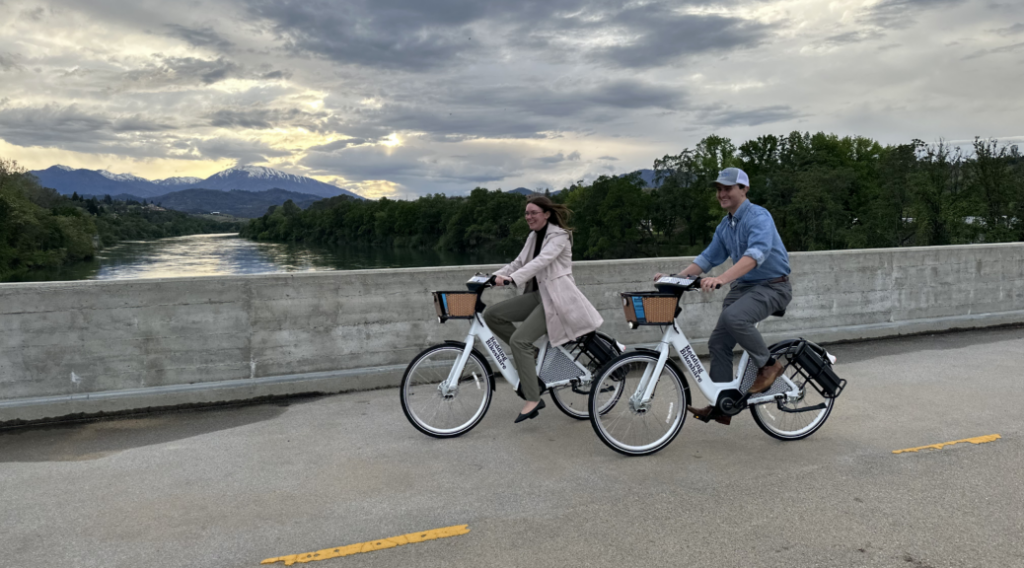
Since 2021, the Shared-Use Mobility Center (SUMC) has convened an Innovative Transit Micromobility Integration (ITMI) working group. In these working group meetings, representatives from transit agencies discuss the challenges and strategies they face in integrating micromobility programs into their transit systems and share knowledge and resources to learn from each other’s experiences. This case study is part of SUMC’s Mobility Innovation Collaborative program and incorporates knowledge gained from a guest presentation at one of these working group meetings.

Originally published August 2024, revised May 2025.
Introduction
In recent years, the demand for first and last-mile services in the US has dramatically increased, causing an upward trend in bikeshare ridership, bikeshare funding, and regional implementation. Bikeshare implementation has become more common, with regions adopting bikeshare programs that fit their specific needs. For instance, in suburban areas, which often have gaps in service connecting residential areas to locations with public transportation, there is an increasing demand for mobility options that transport people to and from public transportation without the use of a personal vehicle. Bikeshare has quickly become one of the most environmentally sound, cost-friendly, and useful first and last-mile services. This is in part due to the variety of service models these programs offer docked or dockless, pedal-assist bikes or standard bikes, and a variety of pricing structures to meet the unique needs of different users.
Recently, Redding Area Bus Authority (RABA), Shasta Living Streets, and Shasta Regional Transportation Agency recognized the opportunity to benefit community members with a new transportation option, and created the Redding Bikeshare First Last Mile Bikeshare Pass program.
This program offers Redding Bikeshare vouchers for residents to connect to fixed-route buses. Redding Bikeshare, owned and operated by local community-based organization Shasta Living Streets, is the culmination of a 10-year vision for providing clean mobility options to the community. In 2023, Shasta Living Streets, in partnership with local agencies and with support from State of California climate funds, launched the bikeshare system with an all-pedal-assist, docked fleet.
In 2024, Shasta Living Streets partnered with RABA to provide a voucher allowing riders to make free transfers between bus and bikeshare. The voucher is a physical slip of paper containing a code that can be entered into the bikeshare app. The voucher can be requested from RABA bus drivers when riders wish to make bus-to-bike connections. This partnership aims to boost ridership for both bikeshare and public transportation, facilitate first and last-mile connections, and improve transportation access in general for Redding residents. Although the voucher has only been available for a few months, Shasta Living Streets has witnessed the positive impact of the program and how it resonates with users. As there is an ever-increasing demand for first and last-mile services in the United States, bikeshare programs have become an even more valuable resource and viable option.
Shasta Living Streets
Shasta Living Streets was founded in 2010 by community members with a passion for improving the quality of life in Redding and Shasta County through transportation and livable community options. Shasta Living Streets focuses on providing value to the community with tangible services and amenities for clean and active transportation. Since its founding, the organization has been instrumental in providing amenities to enhance the livability of neighborhoods, reduce dependency on personal vehicles, enhance community connection, and improve mental and physical health for Redding residents.
Through grassroots efforts and partnerships with local, regional, and state agencies, Shasta Living Streets continues to play a pivotal role in shaping the future of transportation in the region. In 2024, Shasta Living Streets established the Shasta Bike Depot in downtown Redding that assists the community in accessing clean and active transportation options, while offering bike services and educational programs. Anne Thomas, Shasta Living Streets Executive Director, has witnessed firsthand how the organization has “innovated new programs and services, helped shift public and agency vision and direction, and supported projects that have brought more funding, better policy, and breakthrough change to our community.”
Redding Bikeshare
Recognizing the need for alternate methods of transportation and cleaner mobility options, Shasta Living Streets launched Redding Bikeshare in 2023. Shasta Living Streets owns and operates the bikeshare program and is supported through grants from the McConnell Foundation, the Strategic Growth Council, and the Clean Mobility Options (CMO) program, to procure the docks, pedal-assist bikes, support staffing, and marketing materials. Over time, the program plans to expand its fleet with strategically placed stations throughout Redding, and further into Shasta County.
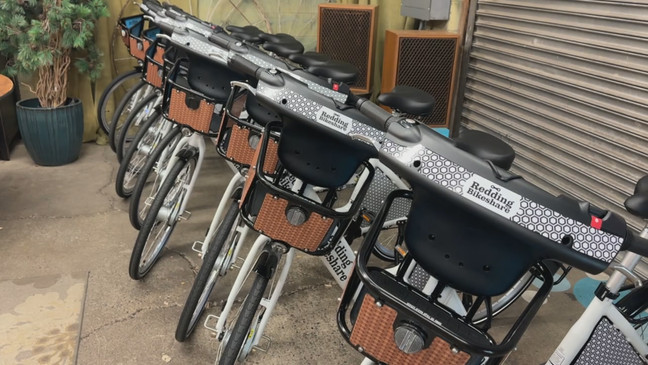
Redding Bikeshare pedal-assist bikes outside of the newly-built Shasta Bike Depot. Credit: KCRC
The bikeshare fleet is a docked, all-pedal-assist program, a great fit for Shasta County due to its many hills and mountains. Currently, this program is the only docked and all-electric program between Portland and San Francisco. Pedal-assist bikes improve accessibility of the system, particularly in light of Redding’s challenging topography; the pedal assist feature makes it easier for riders to navigate all terrains and reduce the impact of heat, distance, and hills on riding conditions. Pedal-assist bike rides have the potential to be a suitable replacement for many car trips in Shasta County. Recent transportation analysis by SRTA shows that most trips in the county are five miles or less, and national data indicates that pedal-assist bike rides are on average nine mile trips.
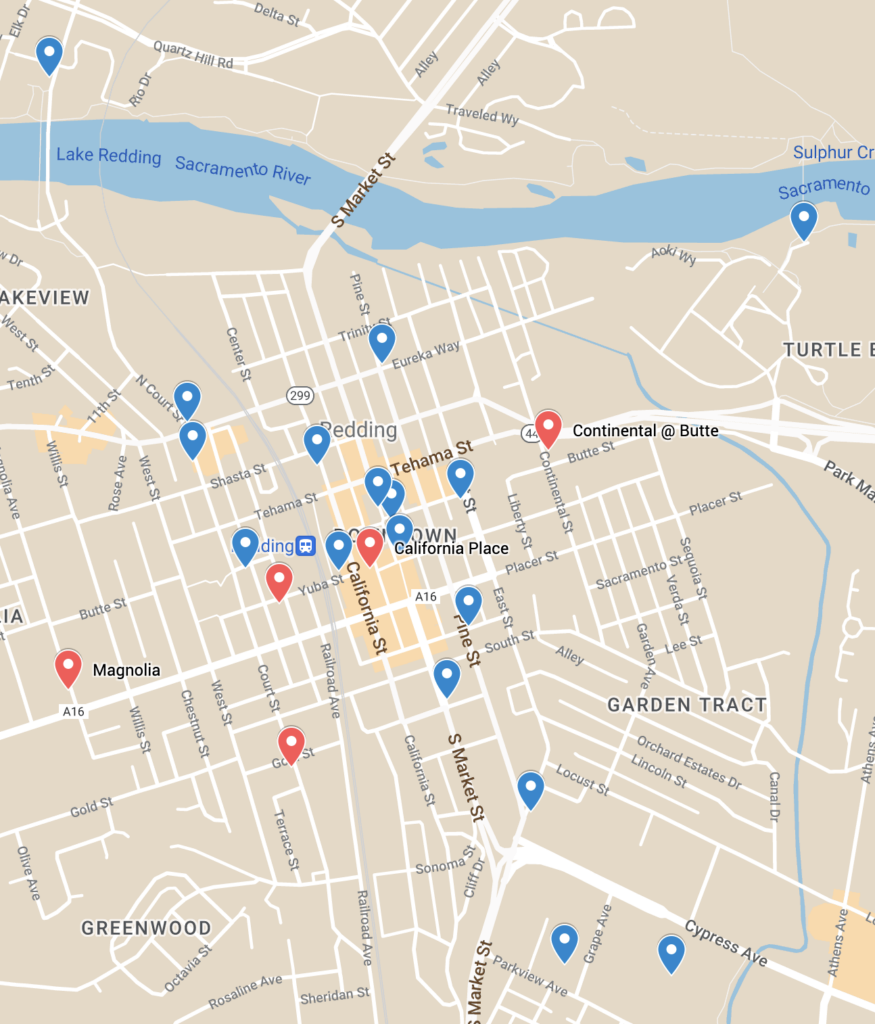
Map of Redding Bikeshare docking stations. Blue pins indicate bikeshare docks added during the initial phase of the program, while red pins are recently added docks. Credit: Shasta Living Streets
The Shasta Bike Depot
After ten years of planning and preparation, Shasta Living Streets launched the Shasta Bike Depot in Summer 2023 with the mission of making Redding and Shasta County more bikeable through various amenities and services, including long term bike parking, visitor services, youth programs, and access to nearby trails. In addition, the Shasta Bike Depot is the headquarters of Shasta County’s bikeshare program, Redding Bikeshare, where users can get more information, and purchase the newly integrated transit voucher. The Shasta Bike Depot also features additional retail space.
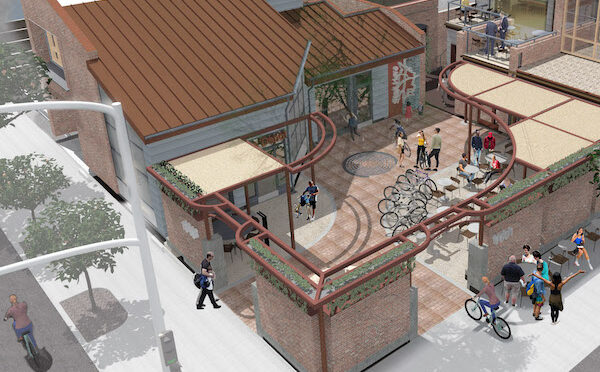
Rendering of the Shasta Bike Depot. Credit: Shasta Living Streets
The Shasta Bike Depot and Redding Bikeshare are initiatives of Shasta Living Streets, with funding from McConnell Foundation, CA Strategic Growth Council, CMO, and in partnership with the City of Redding. In addition to helping people in the area to live an active car-free or car-light lifestyle, the Shasta Bike Depot and bikeshare services will help complement the city’s bike network, economically benefit the downtown area, drive tourism, and enhance ridership on Shasta County’s bike trails. As of 2024, roughly 80,000 people reside within three miles of the Downtown Connector Loop Trail system.
Redding Area Bus Authority
The Redding Area Bus Authority (RABA) manages transportation services in Shasta County with the goal of reducing traffic congestion, providing affordable service and options, and connecting communities to essential services. To move residents and visitors alike, RABA operates 10 fixed bus routes, one of them express, with paratransit and demand response services to accommodate passengers living with disabilities. Altogether, RABA serves approximately 700,000 riders annually, including paratransit and demand-responsive service. In addition, RABA offers a discount card program that assists vulnerable populations and offers discounted access to bus services. Although Shasta Living Streets has always been a partner with RABA to achieve this goal, they have recently become more involved with the creation of the Redding Bikeshare First Last Mile Bikeshare Pass. Their close partnership has facilitated the development and implementation of widely available transportation services.
Bikeshare and Transit Integration in Redding, California
Shasta Living Streets has coordinated with RABA to integrate Redding Bikeshare with available transit services. Some of the integration efforts have been through infrastructure such as the construction of the Shasta Bike Depot and coordination with the Redding Transit Center, or in other ways like discounts and programs.
Integration efforts
Shasta Living Streets coordinates with RABA to provide more cohesive transportation options for all passengers. These organizations work together to develop infrastructure and programs that make multimodal transportation easier and more convenient for all passengers. Some of these initiatives include:
Strategically placed infrastructure
The Shasta Bike Depot is located adjacent to the Downtown Redding Transit Center, and the intermodal services including Greyhound, Amtrak, and RABA.
- The proximity to other transportation services was deliberate, as Shasta Living Streets planned for the Shasta Bike Depot to act as a mobility hub at the Transit Center, providing residents and visitors in the region with a variety of multimodal transportation options.
First/Last mile integration through transfer vouchers
To support first and last-mile bikeshare services, Shasta Living Streets and RABA created a unique voucher that works to benefit bus riders.
- Voucher from the bus driver
- The voucher itself, known as the Redding Bikeshare First Last Mile Pass is a physical piece of paper riders receive at no cost at the end of a bus trip, by making a request of the bus driver. The voucher includes a QR code that prompts users to download the BCycle App and enter the code that is unique to each pass.
- 24-hour access
- With the pass, users receive unlimited 60-minute bikeshare trips for 24 hours. This window allows riders to complete first and last-mile trips to and from transit.
- Prepaid card process
- Redding Bikeshare users need a credit or debit card to access the BCycle app. However, Shasta Living Streets created a process to accommodate the needs of unbanked people and those without credit or debit cards. Redding residents can use cash to purchase a prepaid card that will allow them to access the bikeshare system by visiting the Shasta Bike Depot and following the documentation process that captures contact information, photos of a valid driver’s license/ID, and photos of the customer’s face (this information is kept securely and only used by Shasta Living Streets for this purpose). The customer’s new prepaid card can then be used to create a Redding Bikeshare account, get a pass, and use a bike.
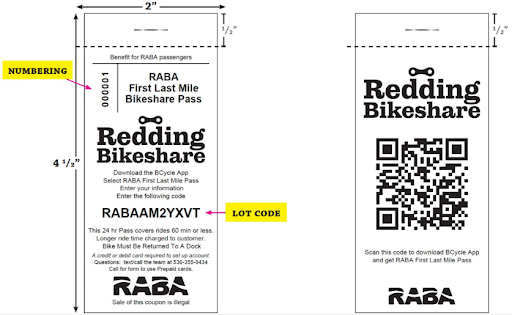
Redding Bikeshare First Last Mile Pass. Credit: Shasta Living Streets
Conclusion
The integration of Redding Bikeshare with the local public transit system represents a significant step forward in promoting convenient, reliable, cost-effective, transportation options in Redding, CA, and providing inspiration for other agencies to create a similar program. Through the collaborative efforts of Shasta Living Streets and RABA, residents benefit from an easier connection between bikeshare and bus services. The implementation of strategically placed bikeshare stations and the Shasta Bike Depot further promotes cleaner transportation options. As bikeshare programs continue to evolve and expand, they stand as a testament to the power of community collaboration and forward-thinking transportation policies. Using Redding, CA as an example, cities can create more connected environments.